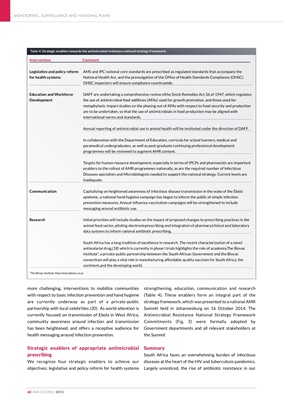
more challenging, interventions to mobilize communities
with respect to basic infection prevention and hand hygiene
are currently underway as part of a private-public
partnership with local celebrities (20). As world attention is
currently focused on transmission of Ebola in West Africa,
community awareness around infection and transmission
has been heightened, and offers a receptive audience for
health messaging around infection prevention.
Strategic enablers of appropriate antimicrobial
prescribing
We recognize four strategic enablers to achieve our
objectives; legislative and policy reform for health systems
strengthening, education, communication and research
(Table 4). These enablers form an integral part of the
strategy framework, which was presented to a national AMR
Summit held in Johannesburg on 16 October 2014. The
Antimicrobial Resistance National Strategy Framework
Commitments (Fig. 3) were formally adopted by
Government departments and all relevant stakeholders at
the Summit
Summary
South Africa faces an overwhelming burden of infectious
diseases at the heart of the HIV and tuberculosis pandemics.
Largely unnoticed, the rise of antibiotic resistance in our
MONITORING, SURVEILLANCE AND NATIONAL PLANS
60 AMR CONTROL 2015
Table 4: Strategic enablers towards the antimicrobial resistance national strategy framework.
Legislative and policy reform
for health systems
Education and Workforce
Development
Communication
Research
AMS and IPC national core standards are prescribed as regulated standards that accompany the
National Health Act, and the promulgation of the Office of Health Standards Compliance (OHSC).
OHSC inspectors will ensure compliance countrywide.
DAFF are undertaking a comprehensive review ofthe Stock Remedies Act 36 of 1947, which regulates
the use of antimicrobial feed additives (AFAs) used for growth promotion, and those used for
metaphylaxis. Impact studies on the phasing out of AFAs with respect to food security and production
are to be undertaken, so that the use of antimicrobials in food production may be aligned with
international norms and standards.
Annual reporting of antimicrobial use in animal health will be instituted under the direction of DAFF.
In collaboration with the Department of Education, curricula for school learners, medical and
paramedical undergraduates, as well as post-graduate continuing professional development
programmes will be reviewed to augment AMR content.
Targets for human resource development, especially in terms of IPCPs and pharmacists are important
enablers to the rollout of AMR programmes nationally, as are the required number of Infectious
Diseases specialists and Microbiologists needed to support the national strategy. Current levels are
inadequate.
Capitalizing on heightened awareness of infectious disease transmission in the wake of the Ebola
epidemic, a national hand hygiene campaign has begun to inform the public of simple infection
prevention measures. Annual influenza vaccination campaigns will be strengthened to include
messaging around antibiotic use.
Initial priorities will include studies on the impact of proposed changes to prescribing practices in the
animal feed sector, piloting electronicprescribing and integration of pharmacy/clinical and laboratory
data systems to inform rational antibiotic prescribing.
South Africa has a long tradition of excellence in research. The recent characterization of a novel
antimalarial drug,(18) which is currently in phase I trials highlights the role of academia.the Biovac
Institute*, a private-public partnership between the South African Government and the Biovac
consortium will play a vital role in manufacturing affordable quality vaccines for South Africa, the
continent,and the developing world.
Intervention Comment
*The Biovac Institute. http://www.biovac.co.za